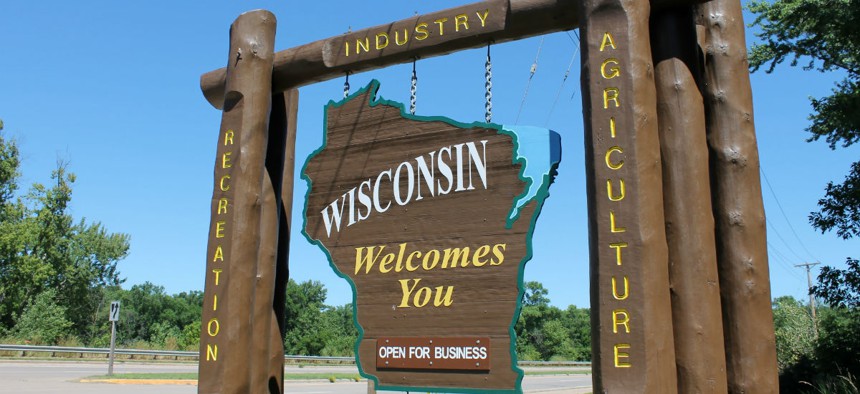Will Wisconsin Prove Too Polite for Trump?
GOP elites have cast doubt on the Republican front-runner’s ability to take the state in a highly contested primary on Tuesday.
If there’s one thing that Ted Cruz and Donald Trump probably agree on, it’s that John Kasich should drop out of the race. The two candidates are mounting pressure on the Ohio governor in an attempt to secure delegate support at the Republican National Convention in Cleveland. “Someone is not electable if he can’t get elected,” Cruz said. Thus far, Kasich has only won one primary: his home state of Ohio, which held its elections on March 15.
NBC News reports that the Trump and Cruz campaigns are working to keep Kasich from being an option for delegates on the convention ballot. Whether or not that happens will depend on the convention rules, which are drawn up by the rules committee. According to NBC, “Both campaigns are backing a rule that would require candidates to achieve a minimum amount of support to get on the ballot, which could block Kasich in Cleveland.”
Kasich’s campaign is familiar with these frustrations. Last month, top Republicans pushed for Kasich’s exit in favor of Marco Rubio. Rubio has since dropped out of the race. But the Ohio governor continues undeterred. “I’m not getting out,” Kasich told reporters on Monday. “Why would I get out, particularly when Trump’s worried I’m going to get his votes?"
For many in the anti-Trump camp, personality is destiny.
Donald Trump won’t win this state, they say, because his latest display of domineering will offend voters. And he certainly won’t win that state because he doesn’t share its sensibilities. Thus were the predictions offered, over and over, in this unpredictable 2016 campaign—and so they were offered ahead of Wisconsin’s primary day.
The “old Germanic ancestry still prevails very much. People are nice,” said former Wisconsin governor Tommy Thompson, who’s supporting fellow Midwesterner John Kasich. “They take their politics very seriously. They don't like insults. They don't like people to take advantage by being hypercritical. There's still a niceness here that hasn't completely worn off."
#NeverTrump-ers are counting on the state’s famed preference for political civility as voters take to the polls Tuesday. Wisconsin’s primary is open, meaning Democrats, Republicans, and Independents can all cast ballots. In total, 42 Republican and 96 Democratic delegates are at stake. Ahead of the race, Texas Senator Ted Cruz looks like he could win the state. If Cruz—or, less likely, Ohio Governor John Kasich—come away with major wins, that would increase the likelihood of a contested GOP convention.
On the Republican side, the last couple weeks have been among the nastiest of the campaign. Trump and Cruz attacked each others’ wives. Trump waffled on his abortion position and questioned the value of NATO, while Cruz named Frank Gaffney, an outspoken critic of Islam, to be one of his foreign-policy advisers. House Speaker Paul Ryan—a Janesville, Wisconsin, native—has critiqued the race’s “ugliness,” and influential Wisconsin talk-radio hosts have challenged Trump in recent interviews. “I know that you realize that here in Wisconsin, we value things like civility, decency, and actual conservative principles,” said Milwaukee’s Charlie Sykes, a Cruz supporter, in an on-air conversation with the front-runner last week.
His predictions may be right: The state’s Republicans may not end up going for Trump. As The Wall Street Journal recently described, GOP voters in Wisconsin are savvy on the issues, and their political literacy may be Trump’s undoing in the state:
Wisconsin Republicans could be Donald Trump’s worst nightmare: a sophisticated electorate guided by a conservative political network that has honed its tactics during 13 state Senate and two statewide recall elections held since Republican Scott Walker became the governor five years ago.
Mr. Trump has built a formidable delegate lead in the Republican presidential primary by appealing to people who are infrequent voters. But they are a rarity here—especially in the vote-rich counties that ring Milwaukee and form the core of the state GOP base.
Walker himself is in the anti-Trump crowd. Months after denouncing Trump’s tone in a speech to suspend his presidential campaign, the governor endorsed Cruz, claiming he’s got the conservative credentials—and the right number of delegates—to pose a real threat to Trump’s candidacy. As a Los Angeles Timesreport described Monday, Cruz is not only favored to win Wisconsin, but he appeared to be “outmaneuvering” his rival “in battles among party insiders for the loyalty of delegates.”
On the Democratic side, the race between Bernie Sanders and Hillary Clinton has been slightly less dramatic, but it’s also growing steadily more combative. Both Sanders’s and Clinton’s attentions have been split between the Badger State and New York, which holds its primary later in April. Sanders is leading in the Wisconsin polls, though not by too much. He could benefit from the state’s demographics—as NPR put it, it has a “lot of white liberals”—and from Independents being allowed to vote. A top Sanders campaign official suggested last week that Wisconsin is “a great proxy for a candidate’s strength in the general election. This is a state that Democrats must have.” After three late-March wins, the Vermont senator would no doubt appreciate a Wisconsin victory as justification for staying in the race.







